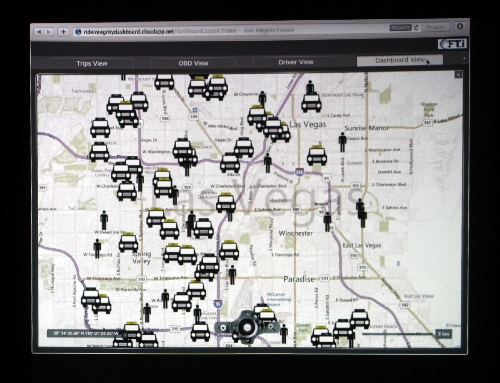Some taxi companies push back on tracking
The key has been turned to road-test a new taxi-tracking system, although some of the local companies want to tap the brakes.
The Nevada Taxicab Authority voted on Tuesday to convene a committee among industry members to draw up guidelines on how to conduct a pilot test of RideIntegrity, a software and hardware package designed to let the authority track cab movements and trip details online. A set of rules and goals could lead to another vote next month to plug in the system on at least 150 cabs to start collecting and posting ride information on a computer dashboard.
If the system performs as advertised, it would dispense with much of the paper now prevalent in the process and display data for regulators and enforcement officers as it happens.
Mark James, the CEO of RideIntegrity developer Frias Transportation Infrastructure, explained that much of the technology, such as GPS sensors, not only exists but has also been deployed in many Las Vegas taxis. However, only the companies can benefit from it.
"We all have this now, and the (companies) can see what is going on," James told the authority members. "It's you who are blind."
While a number programs have hit the market to move the industry away from the traditional fare meters and toward mobile technology, almost all of them tailor their marketing toward cab companies. Frias Transportation Infrastructure, an affiliate of Frias Transportation Management, the largest taxi company in Las Vegas, has targeted government agencies.
Top executives at Yellow Checker Star Transportation, the second-largest cab company, depicted a pilot test as premature given what they consider the embryonic nature of RideIntegrity.
"I could write for pages and pages about all of the business that have tried and failed to introduce reliable technology into our 24-hour a day, desert environment," Yellow Checker Star chief operations officer William Shranko wrote to the authority. "The strong recommendation of my board and I is that Ride Integrity be thoroughly vetted within industry working groups, until the industry reasonably agrees that it be tested on the public."
However, James said that the public would not see the pilot project.
James has promoted one RideIntegrity feature as a solution to the perennial local issue of long hauling, or taxi drivers taking passengers on circuitous routes mainly from McCarran International Airport in order to run up the fares. The system would allow passengers to give consent via a cell phone or tablet to a longer ride, making it legal under Nevada law, and hopefully end the disputes between drivers and passengers over whether approval was given.
But Yellow Checker Star director Jonathan Schwartz described the long hauling function as a way to "get the camel's nose under the tent" with the authority. "We don't know at this point if it will work," he said.
James wanted the pilot test so the company could place an order to manufacture the hardware that will go into the cabs. He wants the test to run from three months to a year.
Authority members Ileana Drobkin and Dean Collins pushed to move ahead with the pilot to begin moving the regulatory technology closer to what has taken root in many other industries. But Dennis Nolan recalled other technology solutions sold to the state government that fell short of promise as a reason not to rush into RideIntegrity.
The Nevada Transportation Authority this month approved a pilot test of the system that covered the area outside Clark County, plus other types of transportation such as shuttle buses and limousines.
Contact reporter Tim O'Reiley at
toreiley@reviewjournal.com or 702-387-5290.

















